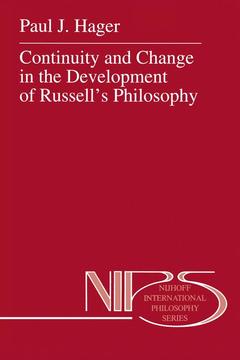Description
Continuity and Change in the Development of Russell’s Philosophy, Softcover reprint of the original 1st ed. 1994
Nijhoff International Philosophy Series, Vol. 50
Author: Hager P.J.
Language: English
Subject for Continuity and Change in the Development of Russell’s...:
Publication date: 10-2012
200 p. · 16x24 cm · Paperback
200 p. · 16x24 cm · Paperback
Description
/li>Contents
/li>Biography
/li>Comment
/li>
The general view of Russell's work amongst philosophers has been that repeat edly, during his long and distinguished career, crucial changes of mind on fun damental points were significant enough to cause him to successively adopt a diversity of radically new philosophical positions. Thus Russell is seen to have embraced and then abandoned, amongst others, neo-Hegelianism, Platonic re alism, phenomenalism and logical atomism, before settling finally on a form of neutral monism that philosophers have generally found to be incredible. This view of Russell is captured in C. D. Broad's famous remark that "Mr. Russell pro duces a different system of philosophy every few years . . . " (Muirhead, 1924: 79). Reflecting this picture of Russell continually changing his position, books and papers on Russell's philosophy have typically belonged to one of two kinds. Either they have concentrated on particular periods of his thought that are taken to be especially significant, or, accepting the view of his successive conversion to dis tinctly different philosophical positions, they have provided some account of each of these supposedly disconnected periods of his thought. While much good work has been done on Russell's philosophy, this framework has had its limitations, the main one being that it conceals the basic continuity behind his thought.
1. Introduction.- One Analysis and Relations — The Key to Continuity in Russell’s Philosophy.- 2. Russellian Analysis in Mathematical Philosophy.- 3. Russellian Analysis in General Philosophy.- 4. A Systematic Account of Russellian Analysis.- 5. Relations in Mathematical Philosophy.- 6. Relations in General Philosophy.- 7. Logical Constructions and Relations.- 8. The Distinctiveness of Russellian Analysis.- Two Theories of Space and Time — The Key to Change in Russell’s Philosophy.- 9. The Impact of Russell’s Philosophical Predecessors on His Space and Time Theories.- 10. Space and Time in the Platonist Phase (1899-1913).- 11. Space and Time in the Empiricist Phase (1914-1918).- 12. Space and Time in the Modified Empiricist Phase (1919 Onwards).- 13. Conclusion.
Paul J. Hager was awarded the 1996 BRS Book Award for Continuity andChange in the Development of Russell's Philosophy.
'... Hager has produced a much-needed demonstration of the constancy in Russell's philosophical methodology. ... the book becomes both a useful guide to Russell's methodology and a detailed dictionary of vital philosophical quotations. In addition, Hager provides an array of diagrams, charts, lists, and other graphics to clearly illuminate his central findings ... I found Hager's work on Russell to be impressive and insightful. ... Hager gives us a useful discussion of methodology and a valuable source book of Russell's views on doing philosophy well.'John Shosky in The Bertrand Russell Society Quarterly, 89 (1996)'Hager presents his account with admirable clarity and anchors it firmly in Russells' writings. He is concerned with what Russell actually thought, rather than with what, according to later philosophers, he ought to have thought. ... Few other books are available which range so widely over Russell's philosophy.'Nicholas Griffin in Australian Journal of Philosophy, 74 (1996)
© 2024 LAVOISIER S.A.S.




